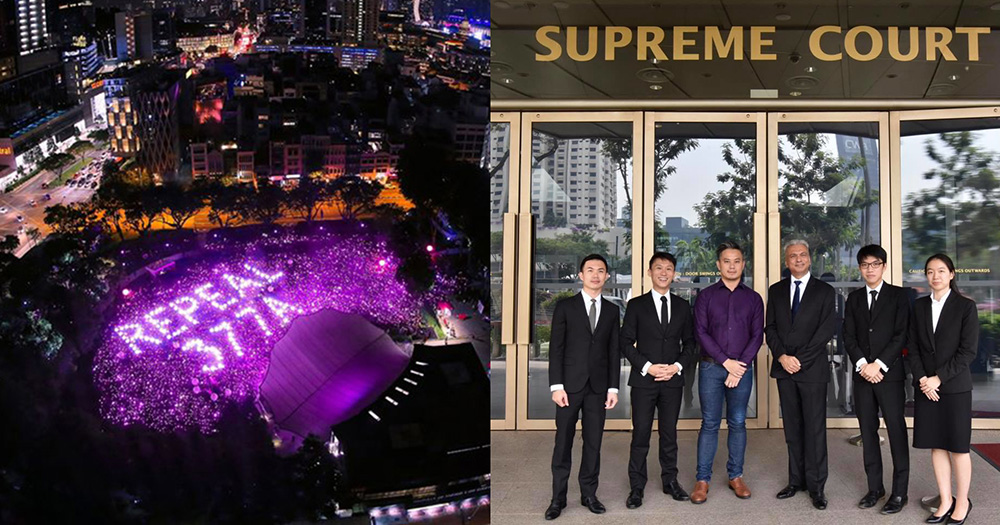Section 377A of the Penal Code was originally intended to curb "rampant" male prostitution during the colonial era and address the issue of British officials who had been involved in such cases.
The law does not criminalise penetrative sex, which was covered instead under Section 377 at that time, but rather, to deal only with non-penetrative sex, which had not yet been made punishable.
It is also inconsistent with Article 12 of Singapore's constitution, which guarantees equality before the law and the equal protection of the law, and Article 14 which guarantees the freedom of expression.
These were the statements set out in the written submissions of the legal team for Bryan Choong, the former executive director of LGBT non-profit organisation Oogachaga on Nov. 13, in the first of three court challenges brought against Section 377A.
Choong was represented in court by Senior Counsel Harpreet Singh Nehal from Audent Chambers, Remy Choo Zheng Xi, Priscilla Chia Wen Qi, and Wong Thai Yong from Peter Low and Choo, and Jordan Tan from Cavenagh Law.
377A was passed in 1938 against backdrop of widespread male prostitution
In elaborating on their position and echoing former Chief Justice Chan Sek Keong's paper on Section 377A, Choong's lawyers referenced a crime report submitted in 1937, a year before 377A was passed in 1938, as context for the legislation.
The lawyers noted that the report singled out male prostitution in particular as an urgent issue, according to submissions filed on behalf of Choong, "“Widespread existence of male prostitution was discovered and reported to the Government whose orders have been carried out”.
Additionally, the report had been considered by the Court of Appeal, as part of an earlier constitutional challenge brought against Section 377A in 2014 by Lim Meng Suang.
The lawyers also referenced a 1940 report declassified in 2016, which highlighted two incidents of British colonial officials who were found to have engaged the services of male prostitutes, as further context for why Section 377A was passed in 1938.
Here, the lawyers added that both cases were found by colonial authorities to have been part of a wider issue of British civil servants patronising such services.
As such, 377A was passed on the grounds of better detecting such incidents and clamping down on male prostitution, as legislation up to that point had been deemed inadequate by then-Attorney-General GC Howell.
In introducing Section 377A at its third reading, Howell wrote:
"As the law now stands, such acts can only be dealt with, if at all, under the Minor Offences Ordinance, and then only if committed in public. Punishment under the Ordinance is inadequate and the chances of detection are small. It is desired, therefore, to strengthen the law and to bring it into line with the English Criminal Law, from which this clause is taken, and the law of various other parts of the Colonial Empire..."
377A does not criminalise penetrative sex
This then brought up the lawyers' next point that Section 377A did not actually criminalise penetrative sex, given that such an act was criminalised under Section 377 instead, during the colonial era.
The legal team noted that the 1938 Penal Code (Amendment) Bill was explicit about this, as it stated, "The section makes punishable acts of gross indecency between male persons which do not amount to an unnatural offence within the meaning of section 377 of the Code."
The lawyers added that this meant Section 377A would serve no legislative purpose in punishing penetrative sexual acts with lighter sentences of up to two years' imprisonment and no fine, as compared to Section 377 with its penalty of up to 10 years' imprisonment and a fine.
Prior to 2007, Section 377 stated that "whoever voluntarily has carnal intercourse against the order of nature with any man, woman or animals, shall be punished with imprisonment for life, or with imprisonment for a term which may extend to 10 years, and shall also be liable to fine".
It was subsequently changed to the criminalisation of sex with a corpse.
Section 377A violates Articles 12 and 14 of Singapore's Constitution
With regard to Article 12, Choong's lawyers argued that Section 377A was inconsistent on the grounds that:
- The original purpose of clamping down on male prostitution no longer applies to Singapore's context, and
- its limited legislative purpose of targeting male prostitution can not necessarily be then broadly applied to private, consensual, and non-commercial intimacies between all men.
Here, they stated that should the 1938 legislation have criminalised female prostitution instead, there is "no question" that the Court would not have concluded that this would also necessarily apply to private, consensual, and non-commercial intimacies between all men and women.
As written in the submissions filed on behalf of Choong:
"Such a law would be a gross violation of the rights of the majority of the population (straight people) who are being restricted from engaging in physical intimacy with a member of the opposite sex simply because Parliament wanted to target female prostitution.
The overly broad scope of the intelligible differentia in that case would be a gross mismatch with the limited legislative purpose, and hence be unconstitutional."
As for Article 14, the lawyers highlighted that Article 14(1)(a) essentially guaranteed "the right of all adult Singaporeans to engage in private, consensual acts of sexual intimacy with whomsoever they desire."
As such, they argue Section 377A is incompatible with Article 14 and unconstitutional on the grounds that it:
"...purports to circumscribe the right of one class of adult citizens (homosexual men) from expressing consensual acts of sexual intimacy, even in the privacy of their own homes and regardless of whether that expression is in the context of a long term, committed relationship."
Top image left photo from Pink Dot SG Facebook, right photo by Sia Ching Sian.
If you like what you read, follow us on Facebook, Instagram, Twitter and Telegram to get the latest updates.
